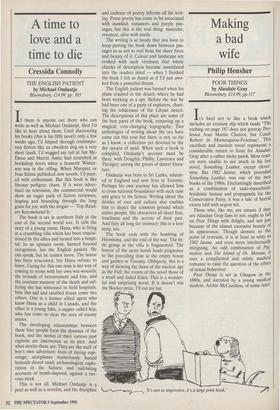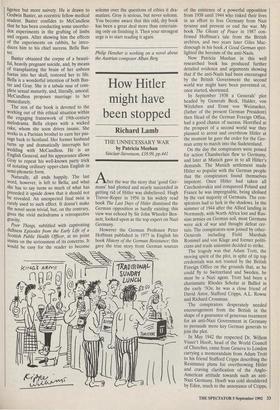Making a bad wife
Philip Hensher
POOR THINGS by Alasdair Gray Bloomsbury, £14.99, pp.317 It's hard not to like a book which includes an erratum slip which reads "The etching on page 187 does not portray Pro- fessor Jean Martin Charcot, but Count Robert de Montesquiou-Fezensac'. This excellent and insolent novel represents a considerable return to form for Alasdair Gray after a rather sticky patch. Most read- ers were unable to see much in his last novel, Something Leather, except clever- ness. But 1982 Janine, which preceded Something Leather, was one of the best books of the 1980s. Enchantingly described as a combination of sado-masochistic fetishistic fantasy and propaganda for the Conservative Party, it was a tale of horrid excess told with urgent wit.
Those who, like me, are unsure if they are Alasdair Gray fans or not, ought to fall on Poor Things with delight, and not just because of the almost excessive beauty of its appearance. Though demure to the point of restraint, it is at least as witty as 1982 Janine, and even more intellectually intriguing. An odd combination of Pyg- malion and The Island of Dr. Moreau, it uses a complicated and subtle medical romance to raise the question of the ethics of sexual behaviour.
Poor Things is set in Glasgow in the 1880s, and narrated by a young medical student, Archie McCandless, of some intel- It's not so impressive, it's a large print book.' ligence but more naivety. He is drawn to Godwin Baxter, an eccentric fellow medical student. Baxter confides to McCandless that he has been conducting some unortho- dox experiments in the grafting of limbs and organs. After showing him the effects of the experiments on rabbits, he intro- duces him to his chief success, Bella Bax- ter.
Baxter obtained the corpse of a beauti- ful, heavily pregnant suicide, and, by means of transplanting the brain of her unborn foetus into her skull, restored her to life. Bella is a wonderful intention of both Bax- ter and Gray. She is a tabula rasa of com- plete sexual maturity, and, literally, amoral. McCandless proposes marriage to her Immediately.
The rest of the book is devoted to the working out of this ethical situation within the engaging framework of 19th-century melodrama. Bella elopes with a wicked rake, whom she soon drives insane. She works in a Parisian brothel to earn her pas- sage back to Scotland. Her former husband turns up and dramatically interrupts her wedding with McCandless. He is an English General, and his appearance allows Gray to repeat his well-known party trick of notating ordinary upper-class English in semi-phonetic form.
Naturally, all ends happily. The last word, however, is left to Bella; and what she has to say turns so much of what has preceded it upside down that it should not be revealed. An unexpected final twist is rarely used to such effect. It doesn't make the novel seem trivial, but, on the contrary, gives the vivid melodrama a retrospective gravity.
Poor Things, subtitled with captivating dullness Episodes from the Early Life of a Scottish Public Health Officer, at no point insists on the seriousness of its concerns. It would be easy for the reader to become solemn over the questions of ethics it dra- matizes. Gray is serious, but never solemn. You become aware that this odd, dry book has been a great deal more than entertain- ing only on finishing it. Then your strongest urge is to start reading it again.
Philip Hensher is working on a novel about the Austrian composer Alban Berg.



















































 Previous page
Previous page